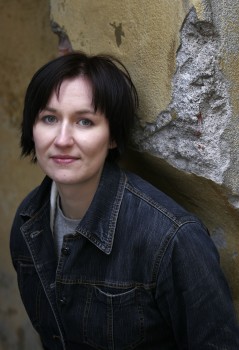Tag: fantasy
Leena Krohn: Erehdys [‘The mistake’]
8 June 2015 | Mini reviews, Reviews
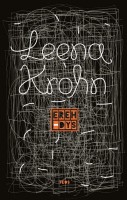 Leena Krohn
Leena Krohn
Erehdys [‘The mistake’]
Helsinki: Teos, 2015. 154 pp.
ISBN 978-951-851-575-6
€24.00, hardback
The protagonist of this new novel by Leena Krohn (born 1947) is an elderly author, E., who one dark and cold winter night arrives by car in a small town to perform in a literary event at a local library. The atmosphere does not seem very welcoming, and as the author begins reading extracts from his works, the comments and questions from the audience are mostly negative and impolite, even hostile. Gradually the sinisterness of the whole event becomes tragicomic; on leaving, the author has to fight his feelings of self-pity and anger. This novel frames E’s life in a portrait of a serious soul in constant pursuit of comprehending life – which he finally seems to acquire in death (in a car accident). The larger part of the novel consists of the stories the author reads; they will be familiar in style to fans of Krohn’s work. Unexpected, strange and unexplicable events and moments of everyday life take the characters by surprise; dreams, memories, remembering and forgetting what has taken place in the history – imagined or real – may perhaps change the way they have lived their lives.
Not so weird?
12 December 2013 | Non-fiction, Reviews
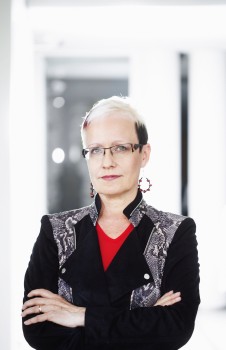
Johanna Sinisalo. Photo: Katja Lösönen
Johanna Sinisalo’s new novel Auringon ydin (‘The core of the sun‘, Teos, 2013), invites readers to take part in a thought experiment: What if a few minor details in the course of history had set things on a different track?
If Finnish society were built on the same principle of sisu, or inner grit, as it is now but with an emphasis on slightly different aspects, Finland in 2017 might be a ‘eusistocracy’. This term comes from the ancient Greek and Latin roots eu (meaning ‘good’) and sistere (‘stop, stand’), and it means an extreme welfare state.
In the alternative Finland portrayed in Auringon ydin, individual freedoms have been drastically restricted in the name of the public good. Restrictions have been placed on dangerous foreign influences: no internet, no mobile phones. All mood-enhancing substances such as alcohol and nicotine have been eradicated. Only one such substance remains in the authorities’ sights: chilli, which continues to make it over the border on occasion. More…
Bring on the white light
12 December 2013 | Fiction, Prose
Extracts from the novel Auringon ydin (‘The core of the sun’, Teos, 2013). Introduction by Outi Järvinen
Jare, March 2017
‘We call the chilli the Inner Fire that we try to tame, just as our forefathers tamed the Worldly Fire before it.’
Mirko pauses dramatically, and Valtteri interrupts. ‘Eusistocratic Finland offers us unique opportunities for experimentation and development. Once all those intoxicants affecting our neurochemistry and the nervous system have been eradicated from society, we will be able to conduct our experiments from a perfectly clean slate.’
‘We fully understand the need to ban alcohol and tobacco. These substances have had significant negative societal impact. And though in hedonistic societies it is claimed that drinks such as red wine can, in small amounts, promote better health, there is always the risk of slipping towards excessive use. All substances that cause states of restlessness and a loss of control over the body have been understandably outlawed, because they can cause harm not only to abusers themselves but also to innocent bystanders,’ Mirko continues.
This is nothing new to me, but I must admit that the criminalisation of chillies has always been a mystery to me. By all accounts it is extremely healthy and contains all necessary vitamins and antioxidants. A dealer that I met once told me that people in foreign countries think eating chillies can lower blood pressure and cholesterol levels – and even prevent cancer. If someone makes a pot of tom yam soup, sweats and pants over it and enjoys the rush it gives him, how is that a threat, either to society or to our health? More…
Me and my shadow
Hotel Sapiens is a place where people are made to take refuge from the world that no longer is habitable to them; the world economy has fallen – like the House of Usher, in Edgar Allan Poe’s story – and with it, most of what is called a civilised society. A rapid synthetic evolution has taken humankind by surprise, and the world is now governed by inhuman entities called the Guardians. ‘Kuin astuisitte aurinkoon’ (‘As if stepping into the sun’) is a chapter from the novel Hotel Sapiens ja muita irrationaalisia kertomuksia (‘Hotel Sapiens and other irrational tales’, Teos, 2012), where several narrators tell their stories
The fog banks have dissipated; the sky is empty. I cannot see the sails or swells in its heights, nor the golden cathedrals or teetering towers. I would not have believed I could miss a fog bank, but that’s exactly what it’s like: its disappearance is making me uneasy. For all its flimsiness and perforations it was our protection, our shield against the sun’s fire and the stars’ stings. Now the relentlessly blazing sun has awakened colours and extracted shadows from their hiding places. The moist warmth has dried into heat and the Flower Seller’s herb spirals have dried up into skeletons. The leaves on the trees are full of bronze, sickly red and black spots. Though there is no wind and autumn is not yet here, they come loose as if of their own volition, as if they wanted to die.
This morning, as I was strolling up and down the park path as usual, I saw another shadow alongside my own.
– Ah, you’re back! I said. – I wondered what had happened to you after you lost your shadow; how did you manage to change into your own shadow yourself? More…
A light shining
28 July 2011 | Essays, Non-fiction
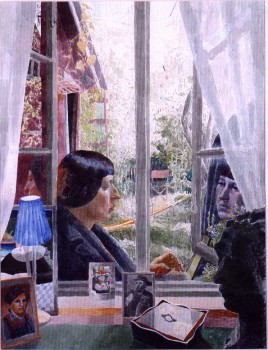
Portrait of the author: Leena Krohn, watercolour by Marjatta Hanhijoki (1998, WSOY)
In many of Leena Krohn’s books metamorphosis and paradox are central. In this article she takes a look at her own history of reading and writing, which to her are ‘the most human of metamorphoses’. Her first book, Vihreä vallankumous (‘The green revolution’, 1970), was for children; what, if anything, makes writing for children different from writing for adults?
Extracts from an essay published in Luovuuden lähteillä. Lasten- ja nuortenkirjailijat kertovat (‘At the sources of creativity. Writings by authors of books for children and young people’, edited by Päivi Heikkilä-Halttunen; The Finnish Institute for Children’s Literature & BTJ Kustannus, 2010)
What is writing? What is reading? I can still remember clearly the moment when, at the age of five, I saw signs become meanings. I had just woken up and taken down a book my mother had left on top of the chest of drawers, having read to us from it the previous day. It was Pilvihepo (‘The cloud-horse’) by Edith Unnerstad. I opened the book and as my eyes travelled along the lines, I understood what I saw. It was a second awakening, a moment of sudden realisation. I count that morning as one of the most significant of my life.
Learning to read lights up books. The dumb begin to speak. The dead come to life. The black letters look the same as they did before, and yet the change is thrilling. Reading and writing are among the most human of metamorphoses. More…
Winning stories of alternative realities
10 February 2011 | In the news
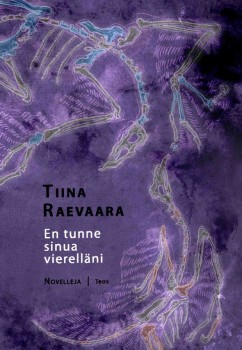 The Runeberg Prize for fiction, awarded this year for the twenty-fifth time, went to a collection of short stories by Tiina Raevaara.
The Runeberg Prize for fiction, awarded this year for the twenty-fifth time, went to a collection of short stories by Tiina Raevaara.
Her En tunne sinua vierelläni (‘I don’t feel you beside me’, Teos, 2010) mixes fantasy and realism, dealing with, for example, animal kingdom, human mind and artificial intelligence. See the introduction and translation of a story which we ran here on the Books from Finland website.
Raevaara (born 1979) holds a doctorate in genetics; the prizewinner is her second work of fiction. The prize, worth €10,000, was awarded on 5 February – the birthday of the poet J.L Runeberg (1804–1877) – in the southern Finnish city of Porvoo.
The jury – representing the prize’s founders, the Uusimaa newspaper, the city of Porvoo, both the Finnish and Finland-Swedish writers’ associations and the Finnish Critics’ Association – chose the winner from a shortlist of eight books: a collection of poetry, Vagga liten vagabond (‘Swing, little wanderer’, Söderströms) by Eva-Stina Byggmästar, the novel Poikakirja (‘Boys’ Own Book’, Otava) by Olli Jalonen, the novel Kiimakangas (WSOY) by Pekka Manninen, two collections of essays, Kuka nauttii eniten (‘Who enjoys most’) by Tommi Melender and Halun ja epäluulon esseet (‘The essays of desire and suspicion’) by Antti Nylén (both publlished by Savukeidas), a collection of poetry, Texas, sakset (‘Texas, scissors’, Otava) by Harry Salmenniemi and another collection of short stories, Apatosauruksen maa (‘The land of the apatosaurus’, WSOY) by Miina Supinen.
Really existing?
30 March 2007 | Fiction, Prose
Extracts from the novel Mehiläispaviljonki. Kertomus parvista (‘The Bee Pavilion. A story about swarms’, Teos, 2006)
There are few old buildings in this town. Most are demolished to make way for new ones long before they reach the end of their first century.
Nevertheless, one brick building in our part of town, built at the beginning of the last century, was spared demolition for a long time. The two-storey building functioned as a Support Centre for the Psychically Ill and later on, for a couple of winters, as a shelter for alcoholics. The board fence that had surrounded the building for decades was taken down long before the building itself, but the maples on the sidewalk cast their shadows on its windows to the very end. When the lilacs and dogwoods in the back garden were in bloom, their heavy racemes shed purple and white on the sand. More…
To sleep, to die
30 September 2004 | Fiction, Prose
Extracts from the novel Unelmakuolema (‘Dreamdeath’, Teos, 2004)
Dreamdeath
Who would not like to cheat the grim reaper? Ways are known, of course, both scientific and non-scientific, but all of them are uncertain and temporary. Except for the simplest: to get there first oneself.
The refinement of this idea was Dreamdeath’s business idea. ‘Dreamdeath – because you deserve it!’ went Dreamdeath’s slogan.
The Dreamdeath home offered those who wished it the means to the most pleasant, even luxurious realisation of an autonomic death in an atmosphere of moral approval, against a suitable fee. At Dreamdeath the client himself decided when and in what conditions he would leave his mortal clay. More…
Perfect thing
Issue 4/2000 | Archives online, Fiction, Prose
Extracts from the novel Ennen päivänlaskua ei voi (‘Not before sundown’, Tammi, 2000). Interview and introduction by Soila Lehtonen
A youngster is asleep on the asphalt in the backyard, near the dustbins. In the dark I can only make out a black shape among the shadows.
I creep closer and reach out my hand. The figure clearly hears me coming, weakly raises its head from the crouching position for a moment, opens its eyes, and I can finally make out what it is.
It’s the most beautiful thing I’ve ever seen.
I know straight away that I want it. More…
The pearl
30 December 1999 | Fiction, Prose
A short story from Tutkimusmatkailija ja muita tarinoita (‘The explorer and other stories’, Loki-kirjat, 1999)
My name is Jan Stabulas. I am one of the quietest and inconspicuous workers in our department store, this giant ant-heap swarming with people. No one really pays any attention to me, although I am on show all the time. My job is quite simple: to stand in the menswear department, dressed in fashionable clothes. Now that doesn’t take much, I have heard it said. Well, try it yourself. Try standing for ten hours, without moving, in an awkward, even an unnatural, position, wishing that the air conditioning would work when it was hot, or that it would be switched off when you can feel the draught cutting you to the marrow. Think how the customers stare at you as they pass by, like an object which they cannot buy, and consider your words once more. More…


